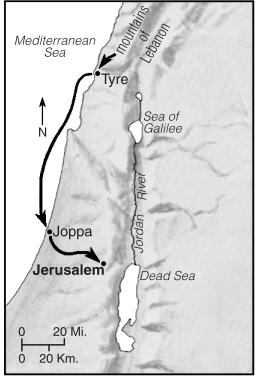
King Hiram Supplies Solomon with Building Materials for the Temple
Cedar logs were cut in Lebanon, floated by sea to Joppa, and then transported to Jerusalem.
Open Bible Data Home About News OET Key
OET OET-RV OET-LV ULT UST BSB MSB BLB AICNT OEB WEBBE WMBB NET LSV FBV TCNT T4T LEB BBE Moff JPS Wymth ASV DRA YLT Drby RV SLT Wbstr KJB-1769 KJB-1611 Bshps Gnva Cvdl TNT Wycl SR-GNT UHB BrLXX BrTr Related Topics Parallel Interlinear Reference Dictionary Search
A B C D E F G H I J K L M N O P Q R S T U V W XY Z
HIRAM
1. King of Tyre during the time of David and Solomon. After David had conquered Jerusalem and moved his capital there, Hiram sent cedarwood, masons, and carpenters to build David’s palace (2 Sm 5:11; 1 Chr 14:1). Hiram remained David’s friend throughout his life (1 Kgs 5:1), and after David’s death, he sought to continue that friendship with Solomon. When Solomon was ready to build the temple, Hiram provided wood from the forests of Lebanon, gold, and skilled craftsmen to help build and furnish the temple; Solomon, in return, gave Hiram wheat and oil for his household. Moreover, Solomon gave Hiram 20 cities in Galilee, although Scripture indicates that Hiram was not pleased with them (1 Kgs 5:1-11; 9:10-14).
Although the Israelites were not a maritime people, Solomon did maintain a fleet of ships at Ezion-geber (1 Kgs 9:26-28). Hiram gave his assistance to Solomon by supplying sailors and perhaps ships to make Solomon’s fleet operable. The Phoenicians were noted sailors, who sailed the Mediterranean Sea as far west as Tarshish in Spain.
Hiram was probably the son of Abibal. Hiram reigned in Tyre for 34 years and died at the age of 53. Phoenician historians record that Solomon married the daughter of Hiram.

King Hiram Supplies Solomon with Building Materials for the Temple
Cedar logs were cut in Lebanon, floated by sea to Joppa, and then transported to Jerusalem.
2. Craftsman from Tyre who worked on Solomon’s temple. He was said to be the son of a man of Tyre and a woman from the tribe of Naphtali (1 Kgs 7:13-14), although 2 Chronicles 2:14 says that his mother was from “the daughters of Dan.” (Possibly her ancestors were from Dan’s tribe; cf. Ex 38:23.) He was responsible for the creation of various furnishings in the temple: 2 bronze pillars, the capitals that adorned the pillars, the molten sea and the 12 oxen on which it stood, the 10 lavers with their bases, as well as shovels, pots, and basins.
His name is also spelled Huram in 2 Chronicles 4:11. He is called Huram-abi (abi meaning “master”) in 2 Chronicles 2:13 and 4:16.